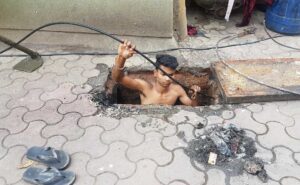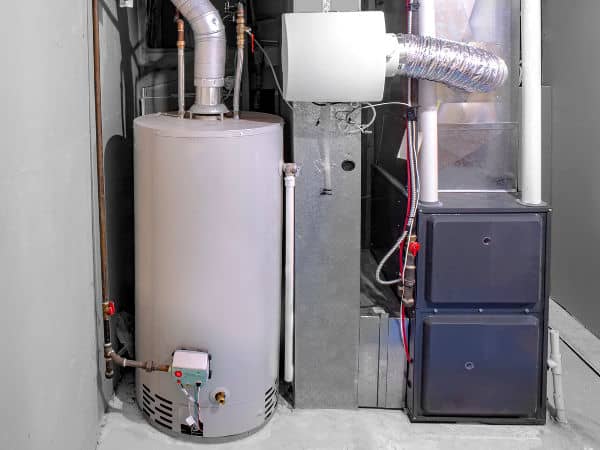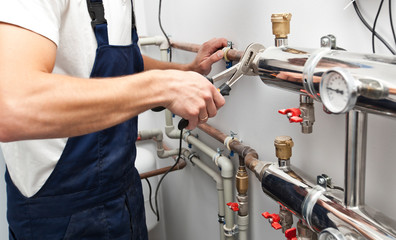The Importance of Sewer Cleaning and Preventive Maintenance
The drain lines in your home connect to the sewer line, which leads to a water treatment plant. These pipes can get clogged with waste, leading to sewage backups.
Regular sewer cleaning can prevent these problems and extend the lifespan of your pipes. Professionals at https://freedomplumbingnj.com/ uses power rodding and other methods to clean the line.
A water softener is a great investment for those who live in areas with hard water. It removes the hardness minerals that cause unsightly spots on sinks, glassware, shower doors, and fixtures and prevents soap scum from forming in your bathtub and kitchen. It also eliminates scale buildup and corrosive damage to pipes and increases the life of appliances and plumbing systems.
The primary way a water softener works is by replacing calcium and magnesium ions with sodium. Soaps and detergents then work more effectively to wash away dirt and grime from dishes, clothes, skin, and hair. This allows you to use less soap, which is good for your budget and the environment.
Another benefit of a water softener is that it prevents mineral buildup in your pipes and appliances, which can lead to clogs and expensive repairs. It can also save you money on your utility bills by reducing the amount of soap and energy used for cleaning.
Soft water is less harsh on your skin and clothes, making them last longer. It is also more effective at dissolving soap curd, which can clog drains and tubs. Water softeners may occasionally clog with mud or clay, so it is important to regularly backwash the system. Also, iron fouling can clog the resin, so it is important to filter the water before it enters the softener.
Water softeners are becoming increasingly popular because of their many benefits, but they are not without drawbacks. The salty water discharged during the regeneration process can raise sodium levels in municipal water supplies, reservoirs, and groundwater tables, potentially harming crops. This has led to new legislation in some areas that limits or prohibits the use of water softeners.
Another issue with water softeners is that the resin can become fouled and clogged with oxidized iron and red rust, so it needs to be periodically regenerated or replaced. This can cost between $500 and $1000, depending on the size of the softener. The good news is that it can be avoided by filtering your water before entering the softener, which will remove dissolved iron and red rust and prevent fouling.
Prevent Clogs
While clogged drains are an inevitable part of owning a home, there are steps you can take to minimize them. Regular sewer cleaning and preventive maintenance can help you bypass costly repairs and messy clean-ups. Keeping your drains clear of hair, food scraps, and other debris can also help prevent clogs.
Most clogs form when materials stick to the sides of your pipes and narrow their passage. Over time, this buildup can cause your drains to slow down or even stop working entirely. If left unchecked, a simple clog can turn into a full blockage that threatens your home’s plumbing system and the health of those inside it.
Thankfully, you can often prevent clogs by taking simple steps like running hot water down all of your drains after using them and installing a mesh strainer or drain grate in your bathtub and shower. You can also use enzymatic drain cleaners, which are safer for your pipes than chemical-based cleaners and can break down waste more effectively.
If you notice your drains smelling foul or getting clogged frequently, it may be time to call for professional help. A professional plumber can use a variety of tools to remove blockages and keep your drains running smoothly. They can also inspect your drain lines with a camera to pinpoint the source of the problem and make recommendations for future care.
The most common way to remove a clog is by using a drain snake or cable machine. This involves feeding a long, flexible rod with an auger at the end into your drain pipe until it reaches the clog. It can then either break through or pull out the clog, leaving your drains open and free of obstructions.
Another option is hydro jetting, which uses high-pressure water to clean out your drain line and remove any solid debris that’s causing an obstruction. This method is particularly useful for stubborn clogs that don’t respond to other methods.
Lastly, many clogs occur because of improper waste disposal. Avoid flushing items that don’t belong in the toilet, such as baby wipes, sanitary products, and grease or oil. Installing a garbage disposal can help cut down on these items, as can a kitchen drain screen or strainer.
Eliminate foul odors.
Foul odors are the result of blocked drains and can be quite unpleasant. A thorough sewer cleaning should eliminate these foul odors. The use of hydrojetting will not only remove clogs and debris but also clean the pipes and ensure that no odor-producing materials remain inside.
Foul odors in bathrooms are most often caused by biofilm accumulation or a dry P-trap. The p-trap is the bend in your drain that collects water and prevents sewer gases from entering your home through the drain. If this water evaporates due to a lack of use or even a blockage, odor-causing materials will be allowed to pass through the drain and into your home.
If you notice a foul smell coming from your bathroom drain, check the p-trap to see whether it needs to be filled. If it does, simply pour vegetable oil down the drain to prevent odors. Aside from this, you can also try running some hot water down the drain to see if that helps.
Odors from kitchen drains are usually the result of a blocked trap or vent. This can be easily fixed by cleaning out the trap and vent or by using a drain cleaner such as Bio-Clean that contains living bacteria that break down waste and prevent odors.
Commercial odors are more difficult to solve and can quickly drive away guests. They are typically caused by a problem with floor drains or plumbing stacks, which is why it is important to have these areas professionally cleaned. Foul odors in restaurants or other food establishments can cause people to leave, leading to a loss of business.
The best way to eliminate foul odors is to have a professional clean your drains and sewer lines regularly with hydro jetting. This will eliminate any odor-producing materials and ensure that all drains are free of blockages and flowing freely. A routine inspection and cleaning will also help prevent odor-producing materials from building up in the first place. Aside from this, regular maintenance will ensure that your drains function properly and efficiently, eliminating any odors before they become a major problem.
Prevent Damage
A clean sewer line is essential for the health and safety of your family. It prevents sewage backups and other unpleasant side effects. Keeping your sewer line clear of obstructions can prevent severe damage to your home and costly repairs. Inspect your home’s drains and appliances for signs of clogging or damage to the underlying pipes on a regular basis. If you notice any problems, schedule a sewer cleaning immediately.
The main line takes wastewater from your house’s drains to the sewage treatment plant. Wastewater includes sludge from toilets, bathtubs, showers, and sinks. In addition, the line carries away rainwater and surface debris. Improperly closed or missing manhole covers allow surface debris to enter the line, which can cause clogs and other problems.
Grease, non-flushable materials, and tree roots can all lead to a clogged sewer system. Pouring grease down the drain can cause it to stick, while flushing non-flushable items such as wipes, tampons, and paper towels can block drains and sewer lines. Tree roots also invade lines, seeking out moisture, nutrients, and shelter. They can erupt through cracks and holes in the line or around loose joints, causing extensive damage and expensive repairs.
During a sewer cleaning, professional plumbers use specialized equipment to inspect and clean the entire length of your pipe. They may utilize a high-powered water jet or cable that runs down the length of the line, clearing away any obstructions. They can also break up larger clogs with special tools such as mechanical cutters and rooters or chemical solutions designed to digest fats, oils, and other waste.
Once the main line is free of obstructions, a plumbing expert can inspect your home’s drains and fixtures for any signs of damage or clogging. They can then recommend an appropriate maintenance program to keep your pipes in good condition.
If you experience a sewage backup, shut off your home’s main water valve to stop the flow of dirty water and contact a sewer cleanup company immediately. If you decide to take on the cleanup yourself, wear protective clothing and rubber gloves to avoid contact with raw sewage. Check your walls, floors, and furniture for signs of water or sewage damage.





